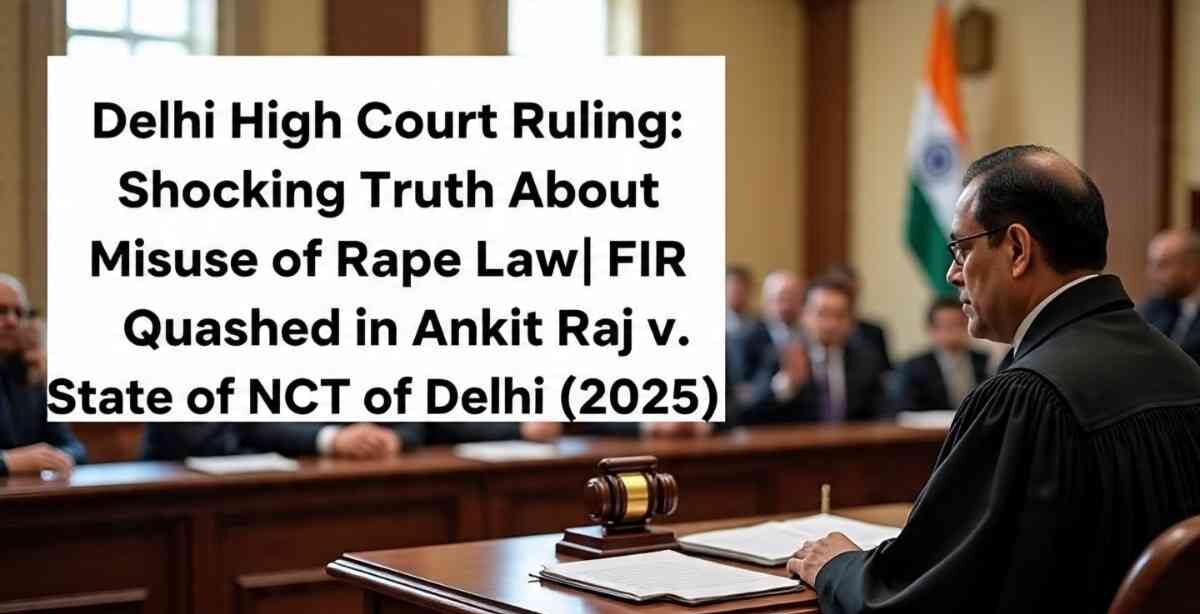Delhi High Court ruling 2025 clarifies that consensual adult relationships cannot be treated as rape under IPC 376. FIR quashed in Ankit Raj case.
Introduction
The Delhi High Court has delivered a significant judgment clarifying the boundaries of criminal law in intimate relationships. In Ankit Raj v. State of NCT of Delhi (Neutral Citation: 2025:DHC:7721), Justice Swarana Kanta Sharma quashed an FIR registered under Section 376 of the Indian Penal Code (IPC), which alleged rape based on a failed relationship.
The Court held that consensual relationships between adults cannot automatically give rise to criminal liability merely because the relationship does not culminate in marriage. The ruling underscores the importance of consent, the misuse of criminal law, and the evolving societal context of adult relationships in India.
Background of the Case
The petitioner, Ankit Raj, was accused of rape by the complainant, who claimed that he had induced her into a sexual relationship under a false promise of marriage. The FIR was registered under Section 376 IPC.
However, during proceedings, it emerged that:
- The complainant was aware of the petitioner’s marital status.
- The relationship continued for some time with mutual consent.
- There was no material evidence that the petitioner had deliberately deceived or coerced the complainant.
On these facts, the Court was asked to decide whether such a failed relationship amounted to rape under Indian law.
Legal Issues Before the Court
- Can a consensual relationship between adults be retrospectively classified as rape when the relationship fails?
- Does knowledge of a partner’s marital status negate the claim of deception or false promise?
- How should courts distinguish between genuine cases of false promise of marriage and consensual intimacy that ends due to changed circumstances?
- Whether the FIR disclosed the essential ingredients of the offence under Section 376 IPC.
Judgment / Key Holdings
The Delhi High Court quashed the FIR with the following observations:
- Consent is Paramount: When two adults voluntarily engage in an intimate relationship, such consent cannot later be withdrawn to criminalize the act as rape, unless it was obtained through fraud, coercion, or false promise of marriage made with dishonest intent from the beginning.
- No Weaponisation of Law: The Court stressed that criminal law is a shield to protect victims of genuine offences, not a sword to settle personal scores after failed romances.
- Awareness of Marital Status: Since the complainant was fully aware of the petitioner’s marital status, the allegation of deception was unfounded.
- Evolving Social Norms: Recognizing the increasing prevalence of live-in and premarital relationships, the Court held that the law must adapt to social realities and protect personal liberty.
Legal Principles Discussed
- Section 376 IPC (Rape): Defines rape and the essential elements, including absence of consent, coercion, or deception.
- False Promise of Marriage: Courts have previously clarified that a false promise amounts to rape only if the promise was dishonest from the beginning. A promise that fails later due to unforeseen circumstances cannot automatically be considered deception.
- Doctrine of Consent: Consent must be free, informed, and voluntary. It cannot be recharacterized as the absence of consent merely because the relationship ends.
- Abuse of Legal Process: Courts must guard against the misuse of criminal law as a tool of vengeance in private disputes.
Case Citation
- Case Title: Ankit Raj v. State of NCT of Delhi & Others
- Neutral Citation: 2025:DHC:7721
- Court: Delhi High Court
- Bench: Justice Swarana Kanta Sharma
- Case No.: CRL.M.C. 3061/2025 & CRL.M.A. 13572/2025
- Date of Decision: 3 September 2025
Importance of the Ruling
- Protects Individual Liberty: Prevents wrongful criminalisation of private, consensual relationships.
- Clarifies Consent: Differentiates between consensual intimacy and sexual assault.
- Discourages False Cases: Sends a strong message against the misuse of the harsh provisions of the rape law.
- Guidance for Future Cases: Directs lower courts to examine facts carefully before treating failed relationships as rape.
FAQs on Delhi High Court’s Ruling in Ankit Raj v. State of NCT of Delhi (2025)
What did the Delhi High Court decide?
The Court held that every failed relationship does not amount to rape. Consensual intimacy between adults cannot be criminalized merely because the relationship ends.
Why was the FIR quashed?
The FIR was quashed because the complainant’s relationship with the petitioner was consensual, voluntary, and with full knowledge of his marital status. No evidence of coercion or fraudulent intent was found.
Does this mean rape allegations in relationships are invalid?
No. If consent is obtained through fraud, coercion, or a false promise of marriage made dishonestly from the outset, it can still amount to rape under Section 376 IPC.
How does this ruling impact future cases?
This decision guides lower courts to scrutinize facts closely and avoid misuse of criminal provisions in personal disputes. It also protects genuine survivors by distinguishing between real offences and misused allegations.
What does this judgment mean for society?
It reflects India’s evolving social norms, where adult relationships and live-in arrangements are more common, while balancing the need to protect genuine victims and prevent wrongful prosecution.
Conclusion
The Delhi High Court’s ruling in Ankit Raj v. State of NCT of Delhi (2025) reinforces a crucial principle of law: consensual relationships between adults cannot be criminalized as rape merely because they fail. The judgment protects personal liberty, ensures judicial balance, and prevents the weaponisation of criminal law, while still safeguarding genuine victims of sexual assault.

























